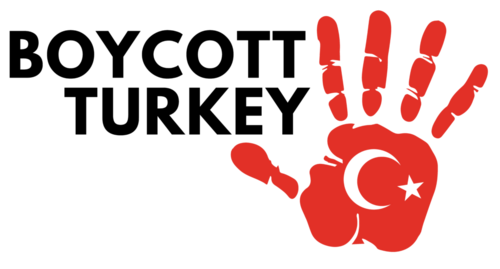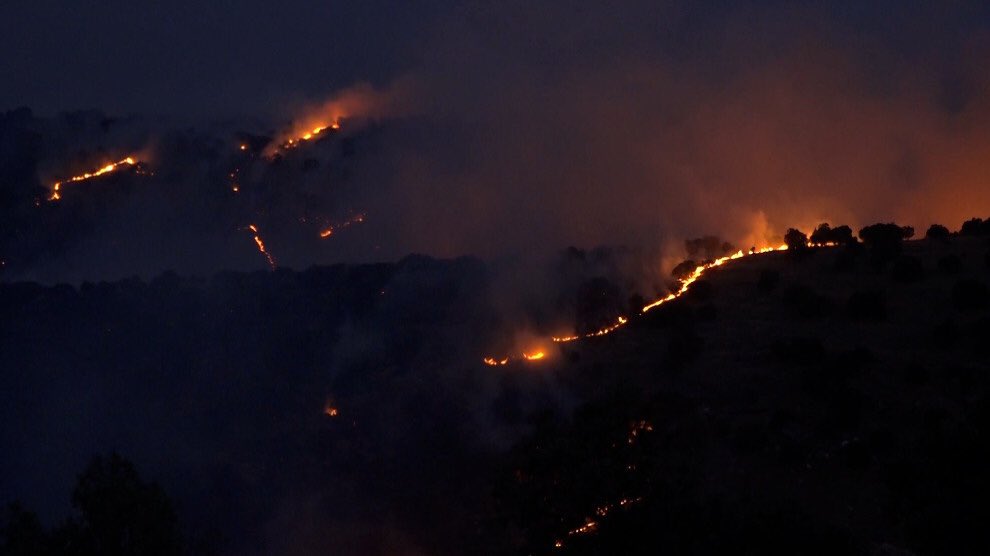On Sunday the 14th of June, the Turkish air force launched 81 separate air strikes across Southern Kurdistan (Northern Iraq) in an apparent escalation of military operations in the region. Several of the 81 locations hit by Turkish bombardment were civilian settlements such Maxmur, Shengal, Kandil, Zap and Xakurk.
Previous air strikes against the refugee camp in Maxmur (also known as Mexmûr) had drawn strong criticism from activists across the world. Many of the refugees in the camp are survivors of the ISIS genocide against Yazidi communities. These new air strikes however are even more shocking given their escalation in scale, and continued targeting of civillians.
Several locations were targeted during the ongoing bombardment in Shengal and Khanasor regions, including the Serdesht Hospital. With bombardment continuing throughout the night into the morning on Monday. Fires are reported to be spreading throughout nearby farmland too, due to the bombing raids.
Footage of the large-scale devastation caused by the bombing can be seen here and here.
The regional government in Northern Iraq, the national Iraqi government, NATO and Russia have remained silent about the air strikes. Despite this silence from the international community, there has been a great deal of outrage from activists across the globe. Kurdish communities across the world recognised the attacks as another escalation in Turkey’s racist war against Kurds.
Global Protests Against the Attacks
In Europe protests took place in several cities and civil society groups expressed their outrage at the violence of the Turkish state. Activists in Mainz dropped banners from a bridge to protest the attacks. Similar protests took place across Germany in the cities of Stuttgart, Munster and Cologne. Numerous protests have also been planned for tonight in most major German cities. Protests against the air strikes also took place in the Paris suburb of Villiers-le-Bel.
In Sweden protesters held a vigil outside of the Swedish foreign ministry building in Stockholm calling on the Swedish government to condemn the Turkish state’s actions.
In Zurich protesters gathered outside the city’s Turkish consulate to condemn the attacks. Protests were also held in Basel. Protesters in Geneva targeted the UN’s lack of action against Turkish state violence by holding a demonstration outside of Geneva’s United Nations offices.
Protests also took place further afield, with protesters in Toronto holding a rally to condemn the air strikes.
The Kurdish Center for Human Rights in Switzerland released a statement condemning the air strikes. The statement further added that: ““Turkey is deepening its occupation of Syrian and Iraqi lands. The silence of international organisations like the UN, EU, the Organisation for Islamic Cooperation, regional states and the U.S.A. and Russia only embolden the Turkish state. The Turkish state wants to make its occupation of Rojava and southern Kurdistan (northern Iraq) permanent just like it did in Cyprus in 1974.”
Whilst few Western governments have spoken up about the attacks some politicians have condemened Turkish militarism. German left-wing MP Ulla Jelpke condemned Turkey’s attacks o and called on the German government to stop all support for the AKP regime.
She added that the attacks were reminiscent of ISIS activity in the region accusing Turkey of acting as if they were ISIS’ air force.
The MEP further said: “The Maxmur refugee camp and the Yazidi settlement areas in Shengal were the main targets of the terrorist organization ISIS. The fact that Turkey now also bombs these targets makes the Turkish army the de facto air force of ISIS. Any support for such a regime must be withdrawn. But the renewed attacks on the Kurdish freedom fighters must also be condemned in the strongest terms. The Turkish state cannot defeat the Kurdish freedom fight militarily – the last 40 years have clearly shown this. Instead, peace negotiations must take place and a political solution must be found, otherwise this war will drag on for decades and cause further unspeakable suffering.”
Today, the Arab League too condemned the attack. The Secretary-General Ahmed Aboul Gheit stated that Turkish military interference “represents an attack on the Iraqi sovereignty, and without coordination with the government in Baghdad”. He added that Ankara “underestimates the international law and its relations with its Arab neighbors.”
Protests in Kurdistan
Protests also took place across Kurdistan. In Northern Iraq authorities tried to crackdown on protests with 24 protesters arrested by security forces at a protest in Erbil. Such action has prompted increased criticism of the KRG regional government and its complicity with the Turkish state.
Massive protests took place in North and Eastern Syria as protesters and the autonomous administration condemned the increased brutality of Turkey’s military operations.
In Qamishlo, thousands of Kurds, Arabs and Syriacs protested under the slogan “No to the occupation by Turkey and the ISIS” at a massive rally against the Turkish large-scale offensive in South Kurdistan. PYD co-chair Ayşe Hiso said during a speech that Turkey’s attacks on Kurdish settlement areas were carried out with “intent to exterminate” and were directed against all peoples of the region.
“The Turkish state is taking revenge for the ISIS, which was defeated by the resistance of our peoples,” Hiso said, condemning the silence of the South Kurdistan autonomous government and the Iraqi central government. Neither Hewlêr (Erbil) nor Baghdad has made any statement on the cross-border attacks of Turkey.
Similar protests took place in Girkê Legê, Til Hemîs, Washokani refugee camp, and Aleppo. In the city of Kobanê thousands of people flocked to the Free Woman Square and marched towards the border crossing leading to Suruç district of Urfa.
A rally was held in this area very close to the border with Turkey, with Ahmed Şêxo from the PYD Executive Council as one of the speakers. Şêxo pointed out the complicity of the European states in attacks and massacres of Turkey, no matter where they happened. “Whoever remains silent is complicit”, he said.
A press conference to give the victims of the air strike a platform to condemn the violence has also been arranged for tonight.
The global protests against this new escalation in Turkey’s brutal war against the Kurds remind us how urgent it is to stand in solidarity with everyone affected by the violent nationalism of the Turkish state. Now more than ever we need to put political pressure on Turkey and anyone complicit in the regime’s war crimes.

